We’re thrilled to announce the latest release of VMware Cloud Foundation (VCF), marking a pivotal moment for platform engineers who have been seeking a unified, enterprise-grade solution for managing Kubernetes (K8s) infrastructure at scale. This groundbreaking release introduces native K8s multi-cluster management capabilities in VCF accessed through the VCF Automation consumption experience. It’s specifically designed to address the complex challenges that platform engineers face when orchestrating K8s workloads across distributed environments.
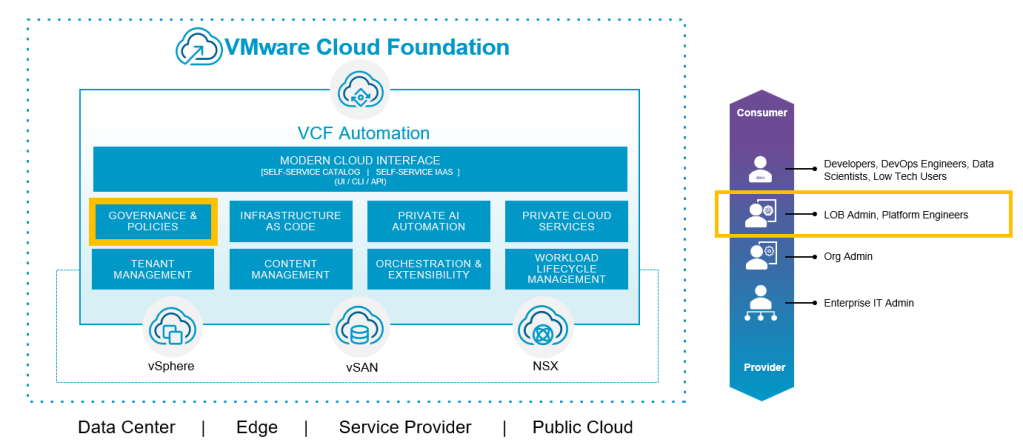
This capability provides platform engineers with control over their K8s environments, while maintaining the simplicity and operational consistency they need. Its new K8s multi-cluster management capabilities complement built-in private cloud services (VM, vSphere Kubernetes Service (VKS) (K8s runtime), Network, Volume, VM Image) that allow engineers to provision VMs and VKS clusters as K8s objects using K8s manifests. Engineers can use the cloud services and Infrastructure as Code to create version-controlled blueprints (e.g., for provisioning VKS clusters and deploying applications on them) publishable to a self-service catalog for developers. Together the new native K8s multi-cluster management and cloud services allow organizations to run their entire application portfolio and manage the underlying K8s infrastructure on a single, streamlined platform.
Platform Engineer Challenges with Kubernetes Infrastructure Management
Platform engineers face an increasingly complex landscape managing K8s infrastructure due to the exponential growth of containerized applications. Traditional approaches can’t accommodate the operational challenges of modern K8s deployments, which often involve numerous clusters and multiple software elements across various environments. This complexity, compounded by K8s dynamic nature, makes maintaining visibility difficult. Engineers frequently battle configuration sprawl, networking complexities, and the steep learning curve of its intricate architecture.
- Multi-Cluster Management Nightmares – Managing multiple K8s clusters introduces a cascade of challenges including configuration drift, inconsistent security policies, fragmented monitoring, and inefficient resource utilization.
- Security and Policy Enforcement Ordeals – Maintaining consistent K8s workload policies, including security policies, across diverse K8s clusters becomes a complex orchestration challenge for platform engineers, often due to the differing configurations, varying compliance requirements, and the sheer volume of clusters that need to be secured effectively.
- Backup and Recovery Pains – Ensuring the resiliency of stateful applications and recovering from regional failures and outages presents a cascade of challenges. Backing up entire clusters or specific namespaces becomes problematic, as platform engineers often lack robust backup solutions. The absence of reliable backup capabilities further creates significant concerns when performing rollbacks for failed upgrades, compromising operational continuity.
- Resource Management Headaches – Balancing performance and reliability across multiple teams and varying workloads is a daunting task for platform engineers, often without proper guardrails to prevent “noisy neighbor” problems or runaway billing spikes, with resources being over-allocated or underutilized.
New VKS Cluster Management Capabilities via VCF Automation
VCF Automation introduces capabilities that directly address K8s multi-cluster management challenges platform engineers face daily. These innovations represent a fundamental shift from fragmented, tool-heavy approaches to a unified, enterprise-grade solution that scales with organizational needs.
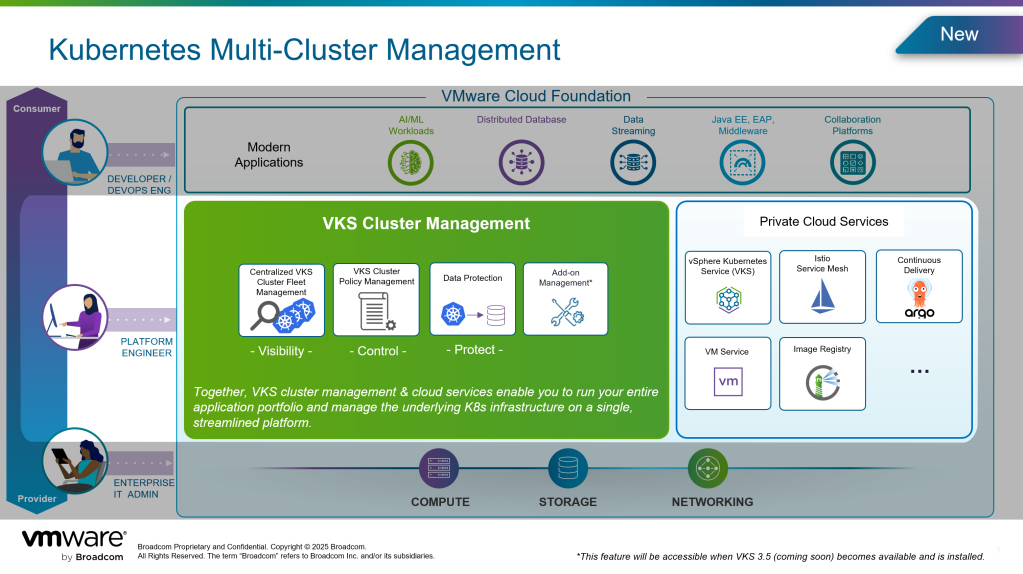
- Centralized VKS Cluster Fleet Visibility – Platform engineers gain a single pane of glass via VCF Automation with a unified view of their geographically distributed VKS cluster fleets running across multiple Projects. Through a grid view, platform engineers have complete visibility and can monitor the K8s versions that are running on the VKS clusters that can aid in preparing for upgrades. Engineers also have centralized observability of workload health and utilization of the VKS clusters, helping to scale K8s infrastructure management.
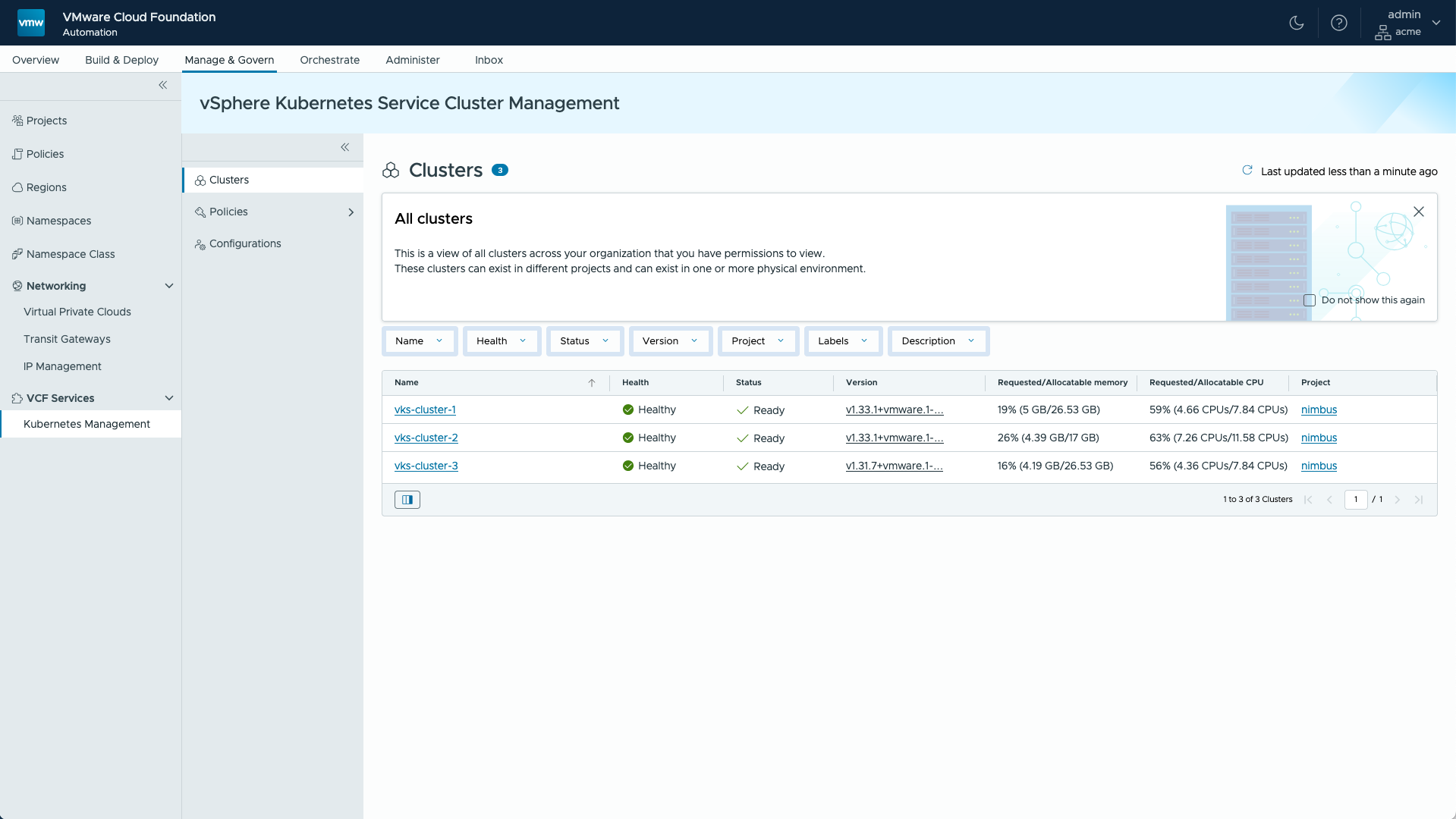
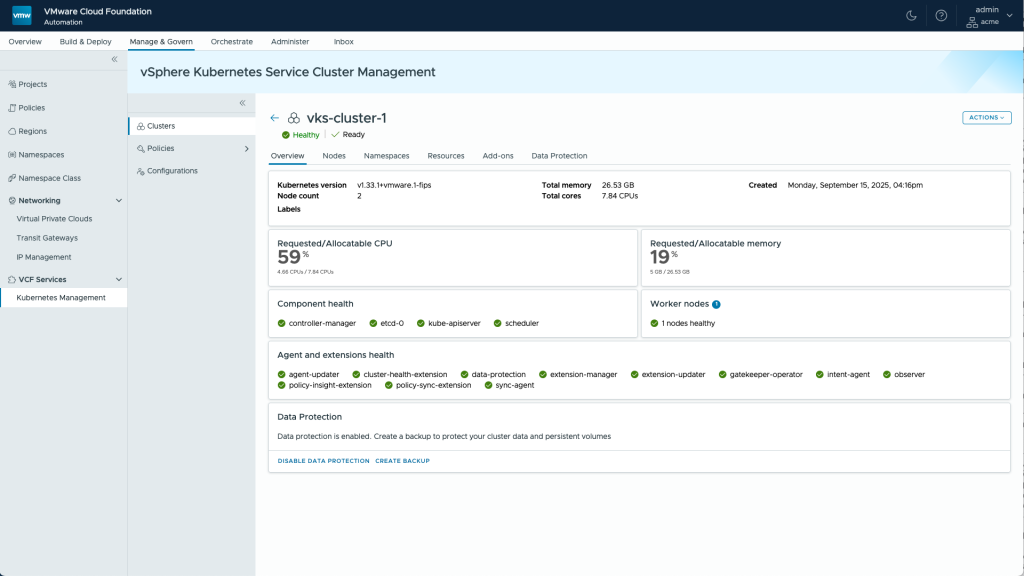
- VKS Policy Management – New K8s workload policy management capabilities enable platform engineers to enforce consistent security and configuration settings across their VKS cluster fleets, helping simplify security posture of clusters and workloads. VCF Automation provides support for Security, Image Registry, Quota, Custom, and Mutation policy types.
VCF Automation also delivers new policy insights, by providing a centralized view of policy adherence and any violations of the policy configurations that are set across the VKS clusters to help scale compliance.
The VKS cluster management capabilities are integrated with the VCF Automation resource hierarchy and data model, so policies can be applied at various levels of the VCF Automation stack, including at the Organization and Project levels. The policies set at these levels will propagate down to the clusters running within them. For example, a platform engineer can establish an image registry policy set for a production Project, ensuring that only trusted images are pulled down and used.
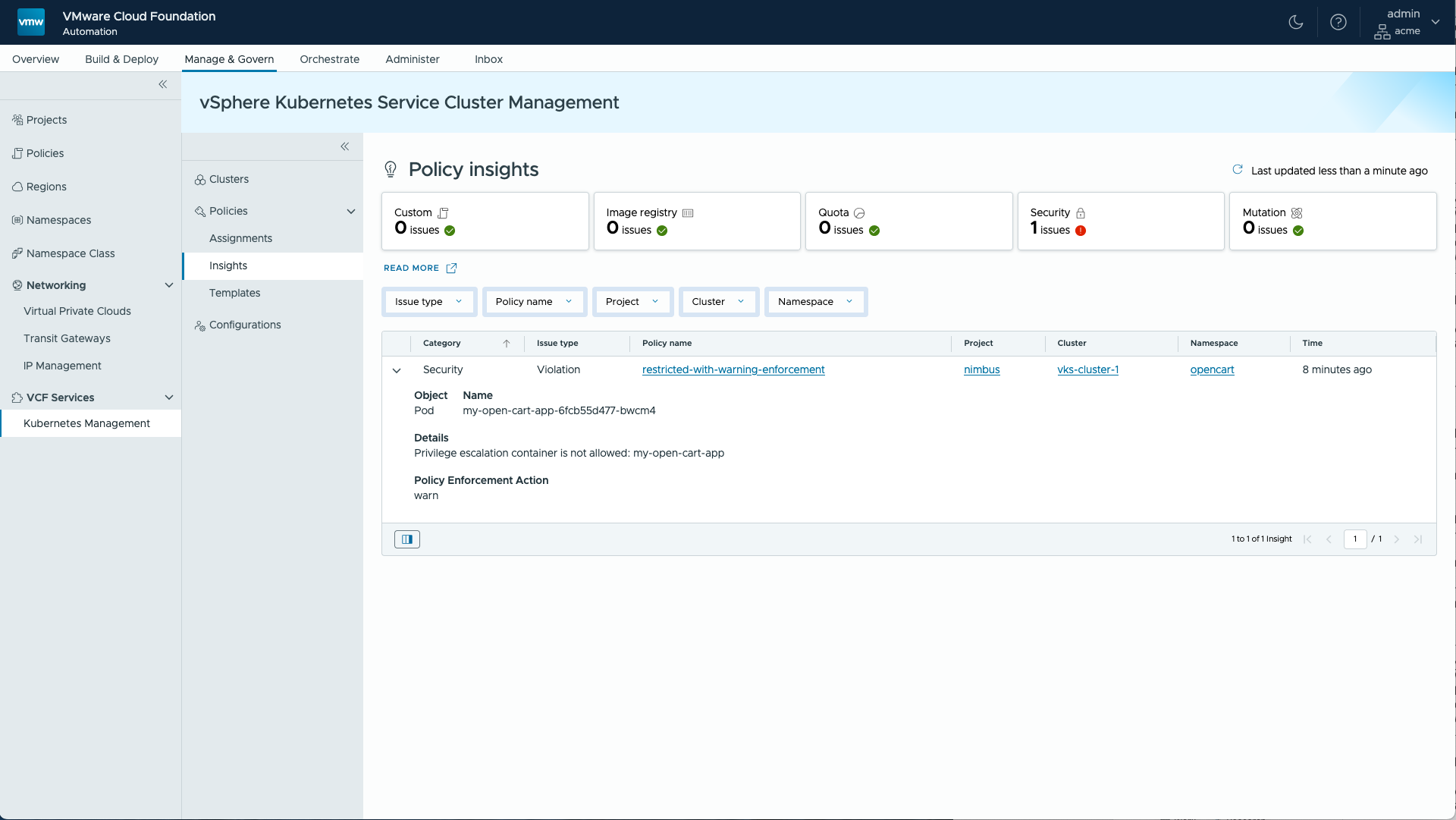
- Data Protection – With new data protection capability, platform engineers can back up entire clusters or specific namespaces, helping to increase the resiliency of stateful applications. CSI snapshots and Restic-based File System Backups (FSB) are supported. Backups can be scheduled or run on-demand. This helps support cluster or application recovery in the event of a cluster failure, region outage, rack power outage, etc. Platform engineers can also back up their VKS clusters prior to performing K8s upgrades to support rollbacks as needed.
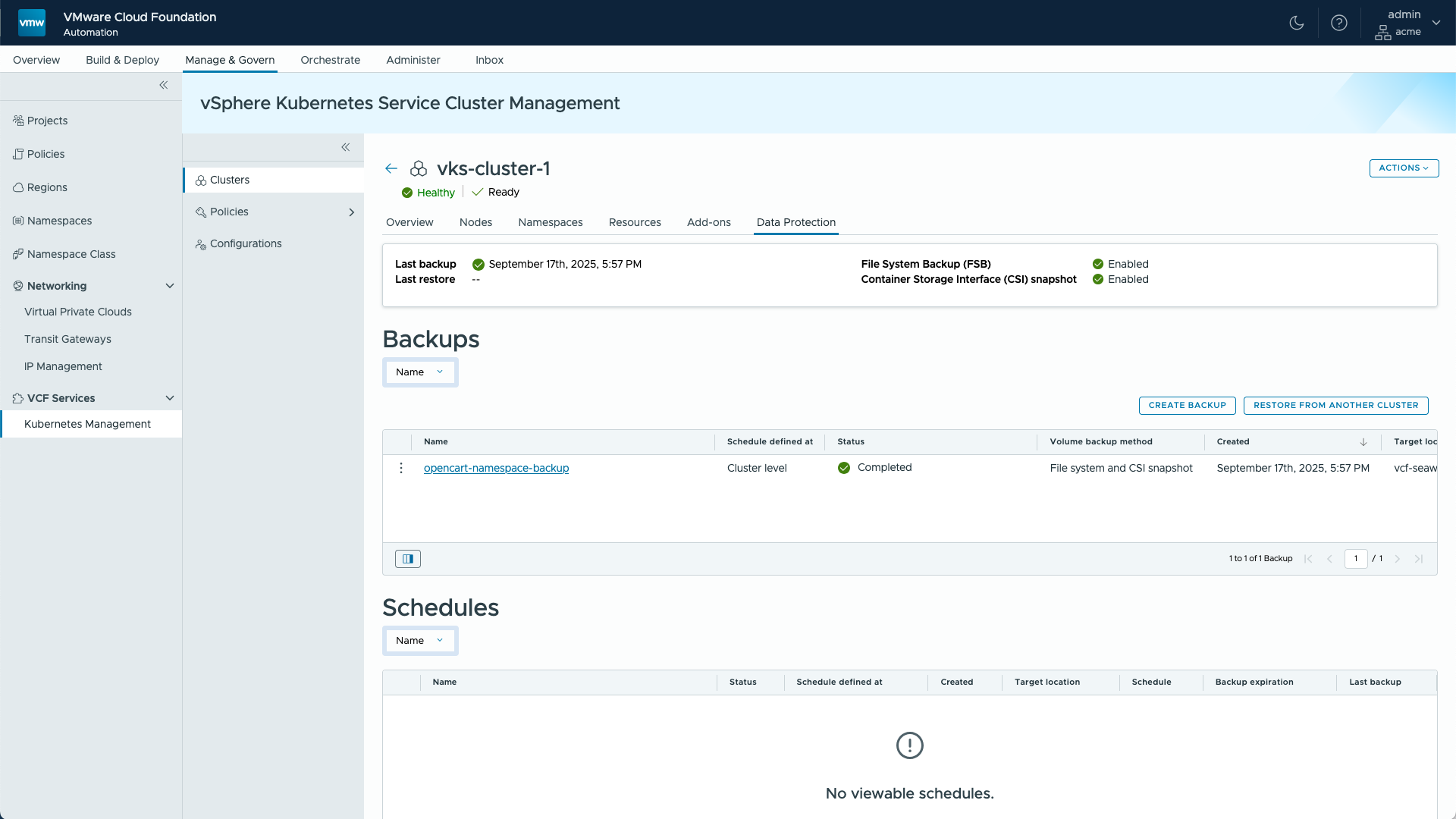
- Add-on Management* – Through the VCF Automation UI, VCF will now natively enable platform engineers to manage VKS standard packages, providing a centralized view of both core and user-managed add-ons running within the organization’s VKS clusters. This will greatly simplify how platform engineers manage the lifecycle of VKS standard packages and add-ons. Platform engineers can now deploy and manage add-ons to VKS clusters simply at the push of a button without having to use the CLI.
*Note: This feature is accessible with VKS 3.5+.
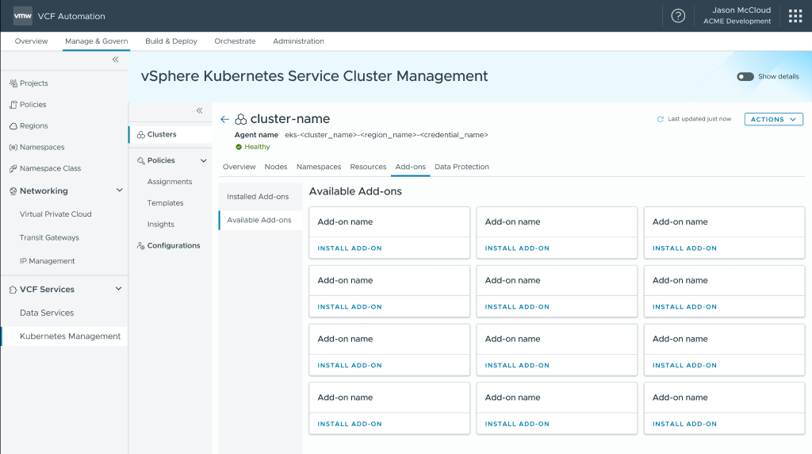
The enhancement of Kubernetes infrastructure management through VCF represents more than just another product release—it’s a fundamental shift toward unified, enterprise-grade cloud operations that gives platform engineers the tools they need to succeed at scale. By combining the power of VMware’s proven virtualization technology with modern cloud-native capabilities, VCF Automation delivers the operational consistency, security, and scalability that platform engineers have been seeking in their multi-cluster Kubernetes environments.
Platform engineers no longer need to choose between the complexity of managing multiple disparate tools nor swivel between different tool interfaces. We’re taking a best of breed approach with products across the Broadcom portfolio specific to Kubernetes management and combining the capabilities under a single platform. VCF provides a comprehensive platform that grows with organizational needs while maintaining the operational simplicity and security requirements that enterprise environments demand. The future of Kubernetes infrastructure management is here, and it’s unified, automated, and ready for the challenges of modern application development.
Learn More
VCF is a single platform that natively supports both VMs and containerized workloads. The platform eliminates the complexity of managing separate infrastructure stacks by providing a unified declarative API that allows users to create, deploy, and manage both VMs and Kubernetes clusters seamlessly. This architectural breakthrough means organizations can finally break down the silos between traditional and cloud-native infrastructure management.
Download VCF 9.0.1 and see for yourself. Embarking on your VCF journey as a platform engineer is designed to be straightforward and immediately impactful.
- Technical Documentation: [VCF 9.0.1] VCF Automation Release Notes
- IDC Spotlight: Overcoming Kubernetes Complexity with Modern Private Cloud
- VCF Breakroom Chats | Episode 59 – Empowering Platform Engineers with Kubernetes Multi-Cluster Management (video)
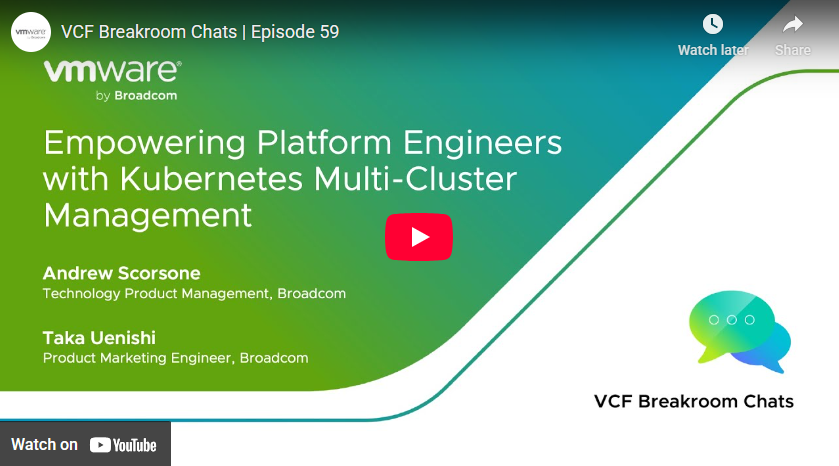
- Technical Demo: Kubernetes Multi-Cluster Management in VMware Cloud Foundation (video)
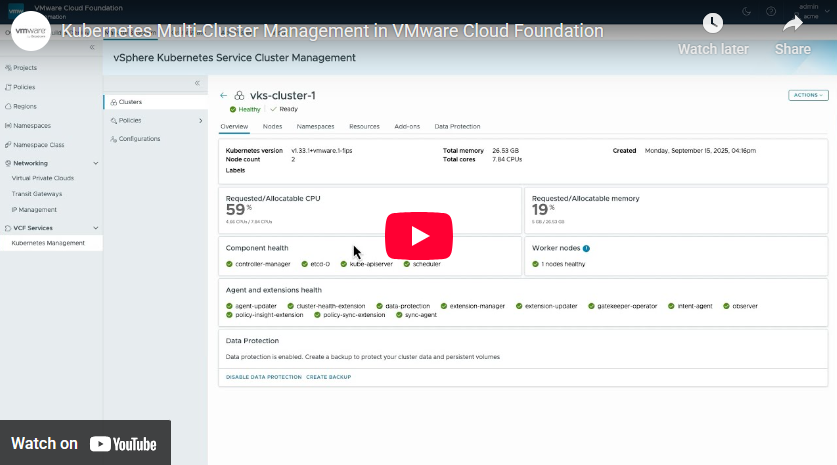
Discover more from VMware Cloud Foundation (VCF) Blog
Subscribe to get the latest posts sent to your email.



